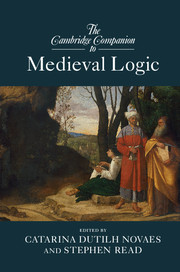Book contents
- Frontmatter
- Contents
- List of Contributors
- Introduction
- PART I PERIODS AND TRADITIONS
- PART II THEMES
- 8 Logica Vetus
- 9 Supposition and Properties of Terms
- 10 Propositions: Their Meaning and Truth
- 11 Sophisms and Insolubles
- 12 The Syllogism and Its Transformations
- 13 Consequence
- 14 The Logic of Modality
- 15 Obligationes
- Bibliography
- Index
12 - The Syllogism and Its Transformations
from PART II - THEMES
Published online by Cambridge University Press: 05 September 2016
- Frontmatter
- Contents
- List of Contributors
- Introduction
- PART I PERIODS AND TRADITIONS
- PART II THEMES
- 8 Logica Vetus
- 9 Supposition and Properties of Terms
- 10 Propositions: Their Meaning and Truth
- 11 Sophisms and Insolubles
- 12 The Syllogism and Its Transformations
- 13 Consequence
- 14 The Logic of Modality
- 15 Obligationes
- Bibliography
- Index
Summary
Every medieval logic compendium, and every medieval commentary on Aristotle's Analytics, has something to say about the syllogism. While there is a core of standard logical syllogistic theory that is unchanging across the Middle Ages, there are also significant theoretical differences from one author to another. Some of these concern the very definition of the syllogism. Aristotle had crafted the classic definition; but at different times during the Middle Ages, and in different traditions, opinions differed on how much of the Aristotelian definition should be retained, and how the retained clauses should be interpreted. In this chapter, we examine some of the more interesting transformations that the definition of the syllogism underwent in the Arabic and Latin Middle Ages.
Conceptions of the syllogism undergo transformations over time. But the syllogism itself, as a logical structure, is also capable of certain types of transformation. One of these gives rise to what Aristotle called conversive syllogisms (Aristotle 1965, 59b1), and we will consider some medieval analyses of this type of transformation. We will also look at a related form of argument, the syllogism through the impossible. And these investigations will lead us back to the question of the nature of the syllogism.
INTRODUCTION
The Aristotelian theory of the syllogism makes use of technical terminology that was to become standard in both the Arabic and Latin traditions. A categorical proposition contains two terms – a subject and a predicate. Such a proposition states that the predicate applies to all, or to none, or to some, or to not all of the subject. Propositions of the first two of these types are universal, those of the last two types particular; these two attributes give a proposition's quantity. Propositions of the first and third types are affirmative, those of the second and fourth negative; these attributes give a proposition's quality. A valid inference from two categorical propositions (the premises) to a third (the conclusion) is a syllogism only if its two premises share a term (the middle term), and each premise shares a term with the conclusion. The predicate of the conclusion is the major term, and its subject the minor term. Three different arrangements of the middle, minor and major terms were standardly recognised, and these arrangements were called the figures of the syllogism. In the first figure, the middle term is subject in one premise and predicate in the other.
- Type
- Chapter
- Information
- The Cambridge Companion to Medieval Logic , pp. 290 - 315Publisher: Cambridge University PressPrint publication year: 2016
- 21
- Cited by



